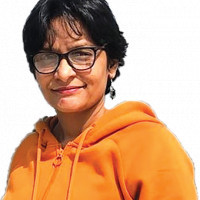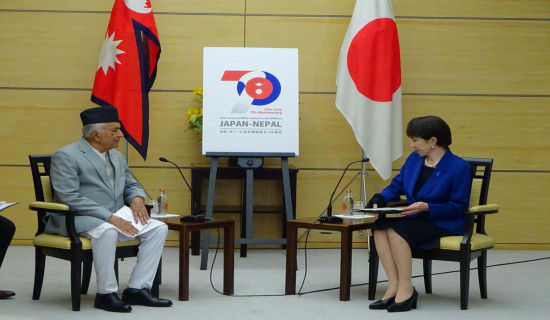- Wednesday, 4 February 2026
Experts call for action on climate change adaptation
Chandragiri, May 24: Local communities are grappling with the impact of climate change and climate-induced weather events, but the focus on adaptation options is insufficient, environment experts and other stakeholders said.
On the second day’s session at the two-day ‘International Expert Dialogue on Mountains, People, and Climate Change: Local Leadership for Adaptation—From Mountains to the Sea’ on Thursday, they called for immediate intervention in local adaptations with the active participation of local communities, especially women and indigenous groups.
“Local communities are on the frontline, trying to navigate the impact of climate change on agriculture, water, and other sectors,” Bimala Rai Paudyal, former foreign minister, said.
Women are at the centre of facing these impacts. They have added responsibilities, but the problem is the lack of gender-responsive technologies and policies for adaptation, she said.
She also stressed the need to increase funding for climate adaptation programmes to mitigate the negative impact of climate change in recent times. She also said that the process of obtaining funding from the Climate Fund needed to be simplified.
“In different places, the impact of climate change varies, and based on the risks, climate policies and plans need to be prioritised. For addressing the challenges and solutions brought about by climate change, local success stories based on local traditional practices need to be brought out, she added.
Stating that the impact of climate change on local governments was beyond their technical and scientific capabilities, she suggested that they needed to provide scientific knowledge to address local issues.
In Chandragiri, Kathmandu, national and international experts discussed diverse issues related to the impact of climate change at the community level from the perspective of local adaptation from Wednesday. They agreed that local people needed to be at the centre of these efforts. However, local government participants argued that the discussion should be more focused on people rather than solely on critical aspects.
Speaking at the session on Climate Justice, Equity and Local Voices, Gender and Youth, Dr. Arzu Rana, Chairperson of the Agriculture, Cooperative, and Natural Resources Committee of the Legislative Parliament, said that to achieve the goals set by SDGs, everyone’s cooperation was necessary as progress had not been made according to the objectives.
She said that when observing the public report presented by the United Nations regarding sustainable development, it was noticed that progress towards sustainable development had not been satisfactory. She also stressed the need to enhance the capacity to address the challenges brought by climate change.
Dr. Rana, who is also a leader of the Nepali Congress, said, “Climate-related agreements need to be legally binding.” The Earth’s temperature has been increasing day by day, leading to increased impacts of climate change in the Himalayan region. “As the causes of climate change increase, the risk of avalanches in the Himalayas is increasing. When discussing climate justice, the role of women in environmental conservation in the Himalayan region is crucial,” she added.
During the session, Justice of the Supreme Court, Sapana Pradhan Malla, said that there was a need to ensure the right of citizens to live in a clean environment. She said that despite people not being able to live in a clean environment, their fundamental right to implementation remained a priority for the court.
Likewise, Dr. Popular Gentle Bhusal, climate expert to Prime Minister Pushpa Kamal Dahal ‘Prachanda’, underlined that all mountainous countries in the world should be univocal to resolve the problems as mountain areas had been mostly affected.
He said that there was a recognition that adaptation and mitigation policies were needed to address gender and vulnerability. Recognition of vulnerable groups such as women, youth, disabled, and indigenous people should be targeted, he added.
He stated, “There is a significant gap in the implementation of climate policy, but the government is committed to ensuring effective implementation. Challenges arise when climate finance does not align with the needs outlined in the policy.”
“There is a major gap in policies and plans concerning the understanding and definition of vulnerabilities and risks, particularly in terms of reducing vulnerability and risks for the most vulnerable groups, including women, indigenous people, youth, and local communities,” he added.
According to Dr. Bhusal, numerous policies and plans fail to adequately recognize the disproportionate impacts of climate change on individuals and communities already grappling with disadvantageous circumstances. These circumstances include factors such as geography, poverty, gender, age, disability, and cultural or ethnic background, among others, he added.
Addressing the panel, Gopal Kumar, a natural resource expert at the International Water Management Institute (IWMI), India, said that the magnitude of extreme events had increased. Credit has gone to the local communities in the hills for maintaining ecological balance, and providing ecosystem services to the plains, he noted.
“Those who are causing climate change are sitting somewhere else, they have more responsibility to fund the mountain people or those struggling to maintain ecological balance. The community is not in a position to pressure them or demand from them, but they are typically in denial or non-committal mode,” he said.
A consistent flow of predictable funds, particularly to the mountain communities, would enable them to adapt in a better way, Kumar said.
Aisha Khan, Executive Director of the Civil Society Coalition for Climate Change (CSCCC) and CEO of Mountain and Glacier Organization (MGPO), said that international cooperation was important in addressing the impacts and solutions of climate change. Khan stated that effective practices should be shared globally.
Additionally, climate engineer Anjali Chalise stressed the necessity of conducting studies and research on environmental issues within the country and encouraged youth involvement in these endeavours.
What local representatives say
Talking to The Rising Nepal, Sharda Kumari Chaudhary, Deputy Mayor of Gadhawa Municipality in Dang, said, “I tried to present concerns from our community, but the discussion was more focused on experts’ views. We need their expertise, but community voices need to be heard too. We are the ones who are suffering and dealing with the changes.”
She argued that the options for adaptation are within the community, and the only things needed were resources and the recognition of local knowledge.
Mugu is one of the districts prone to adverse impacts of climate change, and in recent years, forest fires have been a major concern for the local government. “We do not get enough snow and rainfall, which makes our forests vulnerable to catching fire, but we are trying to find a solution suitable for our area,” said Aishwarya Malla, Deputy Mayor of Chhayanath Municipality in Mugu.
“We have mobilsied local resources to educate locals and make them aware of the impact of fires and how they can be avoided using our own knowledge within the community. This is having some impact, and forest fires are on a declining trend, but we need support from the provincial and federal levels. More than that, we want a platform to effectively voice our concerns.”
The impact of climate change on water is widely seen and documented—access to water is affecting agriculture and the everyday lives of local communities. High hills and mountain communities are the ones in great danger, with Jumla district being one of them.
“We are facing water scarcities in villages, which is creating pressure on women,” said Shanti Kumari Malla Bhandari, Vice-Chairperson of Ghuthichaur Rural Municipality in Jumla. “We are doing what we can with our resources to find solutions. By using local knowledge, we are creating small ponds around springs to help maintain water flow, but this is not enough. We need support from the government and recognition of our efforts,” she said.
















